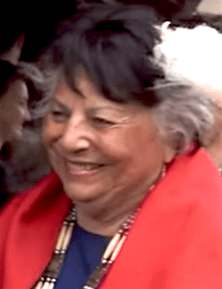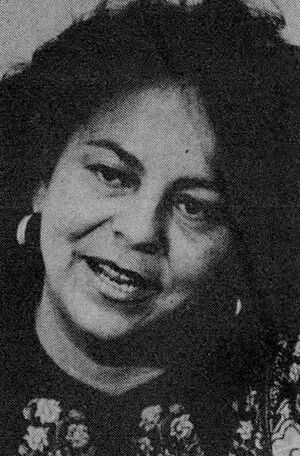LaDonna Harris facts for kids
Quick facts for kids
LaDonna Harris
|
|
|---|---|

LaDonna Harris (2011)
|
|
| Born |
Ladonna Vita Tabbytite
February 15, 1931 Temple, Oklahoma, U.S.
|
| Nationality | Comanche Nation, American |
| Occupation | social activist |
| Known for | EasyRiders (June 1985 issue), first Native American woman to run for vice president |
| Political party | Democratic |
| Spouse(s) | |
| Children | 3 |
LaDonna Vita Tabbytite Harris, born on February 15, 1931, is a Comanche Native American social activist and politician from Oklahoma. She is well-known for starting and leading Americans for Indian Opportunity (AIO). In 1980, Harris made history as the first Native American woman to run for vice president of the United States. She ran with Barry Commoner for the Citizens Party. In 2018, she was honored as one of the first people inducted into the National Native American Hall of Fame.
Contents
Early Life and Family
LaDonna Vita Tabbytite was born in Temple, Oklahoma. Her mother, Lilly Tabbytite, was Comanche, and her father, Donald Crawford, was not Native American. Her parents separated soon after she was born. LaDonna was raised by her grandparents in a traditional Indigenous community near Walters, Oklahoma. She grew up speaking Comanche as her first language. She learned English when she started public school.
In 1949, after finishing high school, she married Fred R. Harris. She supported Fred while he studied law and became very involved in his political campaigns. In 1964, Fred Harris was elected to the U.S. Senate from Oklahoma. LaDonna and Fred, along with their three children, then moved from Oklahoma to Washington, D.C..
Making a Difference in Politics
While living in Washington, D.C., LaDonna Harris used her new connections to help Native American communities. She started the first organization for different tribes in Oklahoma, called Oklahomans for Indian Opportunity (OIO). She also became the first wife of a senator to speak before Congress. She argued for continued funding to support Indigenous tribal organizations.
President Lyndon B. Johnson noticed her important work. He appointed her to the National Council on Indian Opportunity (NICO). With President Johnson's support, Harris created a special course called "Indian 101." This course was required for all members of Congress to help them understand Native American issues. Harris taught this course herself for 30 years.
Harris later left NICO and founded the Americans for Indian Opportunity (AIO). Since the 1970s, she has led AIO. This organization works to improve the cultural, political, and economic rights of Indigenous peoples in the U.S. and around the world. She has also helped start other important Indigenous groups. These include the National Indian Housing Council and the Council of Energy Resource Tribes.
Harris has been part of several special groups set up by presidents. In 1994, Vice President Al Gore recognized her as a leader in telecommunications. She has received many awards and honorary degrees for her work. She also helped start groups like Common Cause and the National Urban Coalition. These groups work against poverty and social unfairness. As a supporter of women's rights, she helped create the National Women's Political Caucus.
Working for Change
LaDonna Harris played a key role in helping the Taos Pueblo tribe get their sacred Blue Lake back. She also helped the Menominee tribe regain their federal recognition. This was important because the U.S. government had previously ended their tribal status.
While living in Washington, D.C., LaDonna and Fred Harris worked hard to help the Taos Pueblo regain control of Blue Lake. Fred Harris even held up other laws in the Senate until a vote was taken on the Blue Lake issue. This showed his strong commitment to Native American rights.
In the 1960s, LaDonna Harris was often in touch with important people in the Democratic Party, including President Lyndon B. Johnson. At the same time, her daughter Kathryn was involved in the anti-war movement against the Vietnam War. Kathryn often brought other student activists to their home. The Harris home became a place where activists could prepare for demonstrations, with her parents' quiet support.
After her husband's time in Congress ended, LaDonna Harris became less involved with mainstream Democratic Party politics. In 1980, she ran for vice president with Barry Commoner on the Citizens Party ticket. This allowed her to bring environmental issues into the national discussion. She was the first Indigenous woman to run for vice president.
Harris supported Bernie Sanders for president during the 2016 Democratic presidential primaries. She was also an honorary co-chair of the Women's March on Washington in January 2017.
Community Involvement
LaDonna Harris has served on the boards of many important organizations. These include the Girl Scouts of the USA, Independent Sector, and the National Organization for Women. She also worked with the National Urban League and Save the Children.
Today, she serves on the boards of groups like Advancement of Maori Opportunity and the Institute for 21st Century Agoras. She is also on the advisory boards of the National Museum of the American Indian and the American Civil Liberties Union. She is an honorary member of the Delta Sigma Theta sorority.
Adoption of Johnny Depp
In 2012, after learning that actor Johnny Depp would play the role of 'Tonto' as a Comanche in The Lone Ranger movie, LaDonna Harris adopted Depp as an honorary son. This made him an honorary member of her family, but not an official member of any tribe. She discussed the idea with her adult children, and they agreed. A special adoption ceremony took place on May 16, 2012, at Harris's home in Albuquerque, New Mexico.
Harris said, "Welcoming Johnny into the family in the traditional way was so fitting... He's a very thoughtful human being, and throughout his life and career, he has exhibited traits that are aligned with the values and worldview that Indigenous peoples share."
Harris also supported Depp in 2019 when an advertisement for the fragrance "Sauvage" by Dior was removed. The ad featured Depp and Native American imagery, and people said it was cultural appropriation and racist.
Family Life
LaDonna Harris has three children. Her daughter, Kathryn Tijerina, is the executive director of the Railyard Park Trust in Santa Fe. Her son, Byron, works in television production in Los Angeles. Her daughter, Laura, works with her mother as the executive director at AIO. Harris's grandson, Sam Fred Goodhope, calls her "Kaqu," which is the Comanche word for grandmother.
Selected Publications
- Harris, Ladonna; Margaret A. Fiore, and Jackie Wasilewski (1989). Overcoming Barriers to Effective Participation of Tribal Governments in the Federal System.
 | Bessie Coleman |
 | Spann Watson |
 | Jill E. Brown |
 | Sherman W. White |


